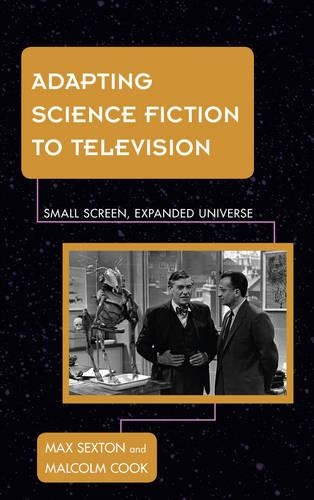
Adapting Science Fiction to Television: Small Screen, Expanded Universe
(Hardback)
Publishing Details
Adapting Science Fiction to Television: Small Screen, Expanded Universe
By (Author) Max Sexton
By (author) Malcolm Cook
Bloomsbury Publishing PLC
Rowman & Littlefield Publishers
1st July 2015
United States
Classifications
Tertiary Education
Non Fiction
Literary studies: fiction, novelists and prose writers
791.45615
Physical Properties
Hardback
198
Width 161mm, Height 236mm, Spine 19mm
426g
Description
Before it reached television, science fiction existed on the printed page, in comic books, and on movie screens for decades. Adapting science fiction to the new medium posed substantial challenges: Small viewing screens and limited production facilities made it difficult to achieve the sense of wonder that had become the genre's hallmark. Yet, television also offered unprecedented opportunities. Its serial nature allowed for longer, more complex stories, as well as developing characters and building suspense over time. Producers of science fiction television programming learned to create adaptations that honored the source materialliterature, comics, or filmwhile taking full advantage of television's unique aesthetic. In Adapting Science Fiction to Television: Small Screen, Expanded Universe, Max Sexton and Malcolm Cook examine how the genre evolved over time. The authors consider productions in both the UK and the United States, ranging from Walt Disney's acclaimed "Man in Space" in the 1950s to the BBC's reimagined Day of the Triffids in the 1990s. Iconic characters from Flash Gordon and Captain Nemo to Superman and Professor Quatermass all play a role in this history, along with such authors as E. M. Forster and Wernher von Braun. The real stars of this study, however, are the pioneering producers and directors who learned how to bring imagined worlds and fantastic stories into living rooms across the globe. The authors make the case that television has become more sophisticated, capable of taking on larger themes and deploying a more complex use of the image than other media. A unique reappraisal of the history and dynamics of the medium, Adapting Science Fiction Television will be of interest not only to scholars of science fiction, but to anyone interested in the early history of television, as well as the evolution of its unique capacity to tell stories.
Author Bio
Max Sexton is a lecturer at the University of Surrey. He is currently interested in adaptation and other inter-medial areas between film and television, including debates about the use of live performance, spectacle, and narrative. Malcolm Cook is a lecturer at Middlesex University and Central Saint Martins, University of the Arts, London. He has published on animation, early cinema, and their inter-medial relationships.
